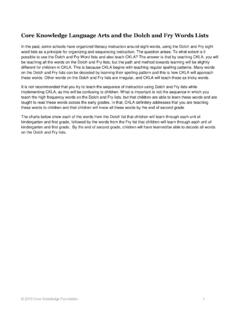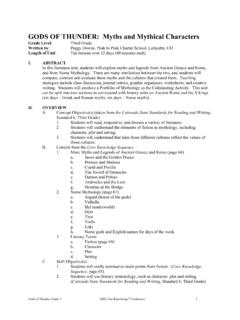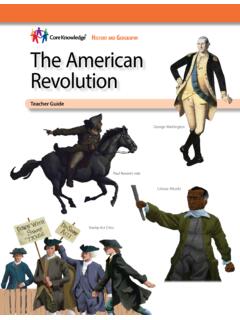Transcription of Core Knowledge Sequence
1 Core KnowledgeSequenceContent and Skill Guidelines for Grades K 8 PLEASE NOTE you are free: to Share to copy, distribute and transmit the work to Remix to adapt the workUnder the following conditions: Attribution You must attribute the work in the following manner: This work is based on an original work of the Core Knowledge Foundation made available through licensing under a Creative Commons Attribution-NonCommercial-ShareAlike Unported License. This does not in any way imply that the Core Knowledge Foundation endorses the work.
2 Noncommercial You may not use this work for commercial purposes. Share Alike If you alter, transform, or build upon this work, you may distribute the resulting work only under the same or similar license to this the understanding that:For any use or distribution, you must make clear to others the license terms of this work. The best way to do this is with a link to this web page: 2013 Core Knowledge All Rights DIRECTION AND DESIGN: Liza Greene and Holly Lanigan COVER: Liza Greene 2010 Core Knowledge FoundationISBN 978-1-890517-25-0 First printing of Core Knowledge Sequence for Preschool Grade 8 Ninth printing of Core Knowledge Sequence for K 8 Prior editions 1988, 1990, 1991, 1992, 1993, 1995, 1997, 1998, 1999 Core Knowledge FoundationThird printing of Core Knowledge Preschool SequencePrior editions 1997.
3 2000 Core Knowledge FoundationThe Core Knowledge Foundation hereby grants permission for individual reproduction of the Core Knowledge Sequence for noncommercial purposes. No part of this document may be reproduced or used in any other form or by other means graphic, electronic, mechanical, including recording, taping and information storage and retrieval systems without prior written permission and license from the Core Knowledge Foundation. Requests for permission and license should be directed to: Core Knowledge Foundation 801 East High Street Charlottesville, VA 22902 telephone: (434) 977-7550 fax: (434) 977-0021 e-mail: home page: Core Knowledge is a trademark of the Core Knowledge Letter from the Founder.
4 I Preface What's New in the 2010 Edition? .. iiWhat Support is Available for Implementation of Core Knowledge .. v Introduction What is the Core Knowledge Sequence ? .. vi Teaching the Core Knowledge Sequence .. viThe Sequence as the Core of the Curriculum .. viThe Consensus Behind the Core Knowledge Sequence .. vii Equal Access to Knowledge Promotes Excellence and Fairness .. viii Multiculturalism in the Sequence .. viii The Arts in the Curriculum .. viii Core Knowledge Schools .. ix Resources for Teaching the Core Knowledge Sequence .
5 Ix Preschool Please flip this publication over to view the Preschool Sequence . Kindergarten Overview of Topics .. 2 Language Arts .. 3 World History and Geography .. 12 American History and Geography .. 13 Visual Arts .. 15 Music .. 16 Mathematics .. 18 Science .. 20 Grade 1 Overview of Topics .. 24 Language Arts .. 25 World History and Geography .. 35 American History and Geography .. 37 Visual Arts .. 39 Music .. 41 Mathematics .. 43 Science ..45 Grade 2 Overview of Topics .. 50 Language Arts .. 51 World History and Geography.
6 61 American History and Geography .. 63 Visual Arts .. 66 Music .. 68 Mathematics .. 70 Science .. 73 Grade 3 Overview of Topics .. 78 Language Arts .. 79 World History and Geography .. 83 American History and Geography .. 85 Visual Arts .. 88 Music .. 90 Mathematics .. 92 Science .. 95 Grade 4 Overview of Topics ..100 Language Arts ..101 ContentsWorld History and Geography ..105 American History and Geography ..109 Visual Arts ..112 Music ..114 Mathematics ..116 Science ..119 Grade 5 Overview of Topics .. 124 Language Arts.
7 125 World History and Geography .. 129 American History and Geography .. 133 Visual Arts .. 136 Music .. 138 Mathematics .. 140 Science .. 143 Grade 6 Overview of Topics .. 148 English .. 149 World History and Geography .. 153 American History and Geography .. 158 Visual Arts .. 160 Music .. 162 Mathematics .. 164 Science .. 168 Grade 7 Overview of Topics .. 174 English .. 175 History and Geography .. 180 Visual Arts .. 186 Music .. 188 Mathematics .. 190 Science .. 193 Grade 8 Overview of Topics .. 198 English.
8 199 History and Geography .. 204 Visual Arts .. 210 Music .. 212 Mathematics .. 214 Science .. 216 Appendix AWhy Listening and Learning are Critical to Reading 223 Appendix BUsing Trade Books to Achieve College and Career Readiness: The Principles of 227 Appendix CDomains and Core Content Objectives for the Core Knowledge Language Arts Program, K 240 Appendix DCore Knowledge Grade-by-Grade Resource 266 Core Knowledge at a 268 The Core Knowledge SequenceA Letter from the Founder of the Core KnowledgeFoundation, E.
9 D. Hirsch, , 2010 Dear Friend of Core Knowledge , The Board of Trustees of the Core Knowledge Foundation has long desired to make the Core Knowledge Sequence freely available for all non-commercial use. Frankly, what has held us back is simple economics. Even nonprofits need to pay bills, and the Sequence , our guide to the specific Knowledge that forms the foundation of a sound, well-rounded education, has long been our biggest seller. Income from its sale allows us to break even so we can continue to advocate for a solid elementar y curriculum and support a growing network of Core Knowledge Core Knowledge is still worried about breaking even, times have changed.
10 Today, more people recognize that a core curriculum is critical to significant educational improvement. Growing acceptance of our fundamental proposition is now being evidenced in the promising decision of several states to get behind a common core of K 12 standards in language arts and math. It would be contrar y to our basic mission if we did not tr y to help this promising new effort prosper and succeed. From its founding in 1986, Core Knowledge has worked to help teachers and parents understand that all of our most important goals in education reading comprehension, language competence, and critical thinking depend on broad Knowledge , and cannot be successfully attained through language-arts instruction alone.









